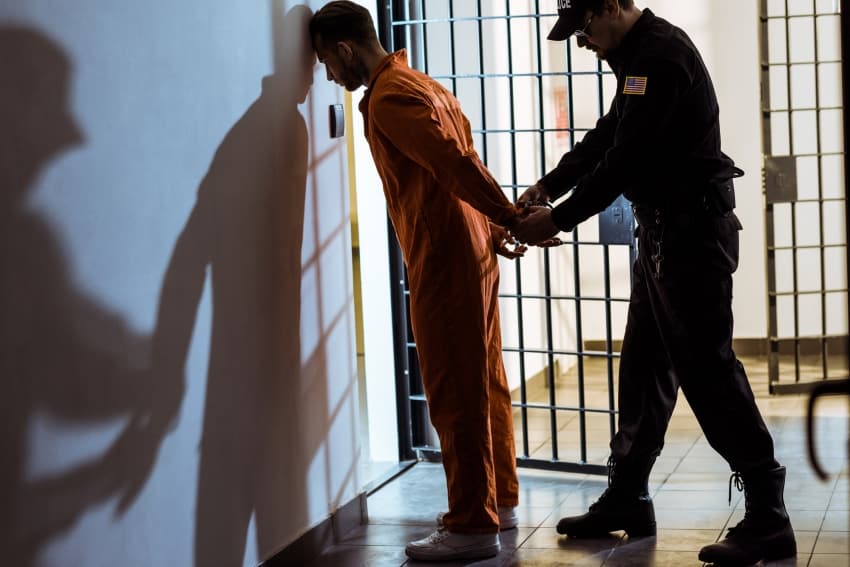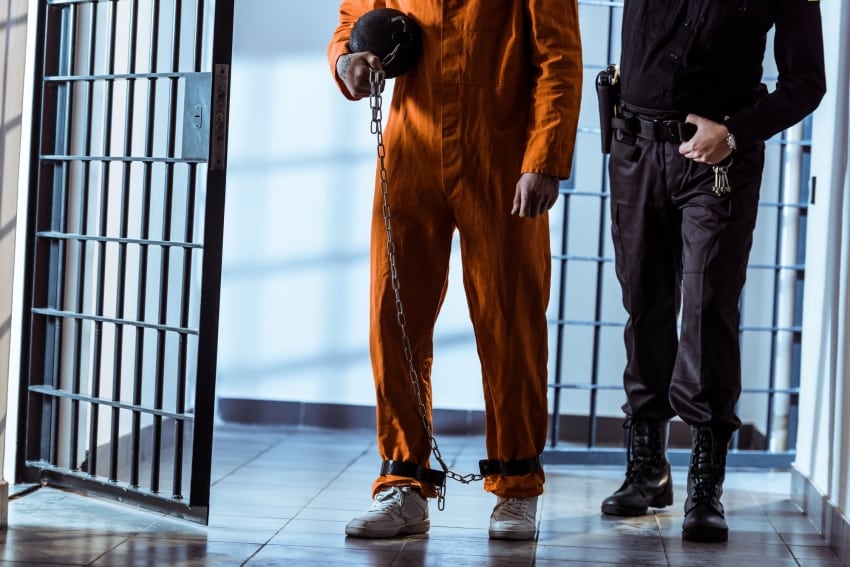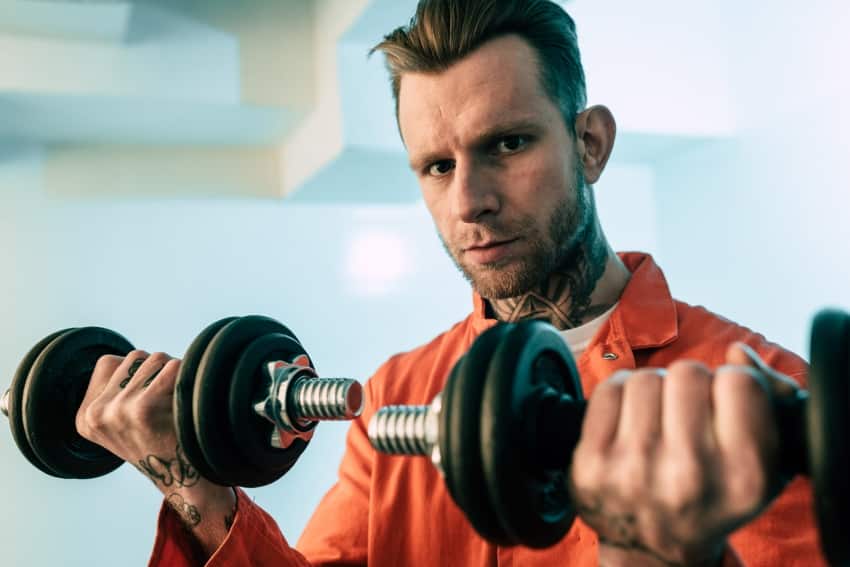A correctional officers, also called corrections officer or correction officer, serves the noble role of protecting society from its most dangerous individuals.
Looking for a correctional officer school? Hit the button above to find schools & training in your area.
A path as a correctional officer is a good choice for those who have a strong sense of justice and want to help society.
There is no standard educational path to become a correctional officer. As such, your degree options are very broad.
We are going to cover some different educational paths you can take to prepare yourself or a career as a correctional officer.
Steps to Becoming a Correctional Officer
Here is a short step-by-step guide on how to become a correctional officer:
Step 1: Get a high school diploma/GED
All correctional officer jobs require employees to have graduated from high school.
Step 2: Complete a degree program (optional)
If you want to work in a local corrections facility you do not have to have any college education. However, if you want to work at a state or federal level, you will need to complete some college education. Correctional officer schools will have more information. Simply hit the button at the top of this page to find out more.
Step 3: Find employment
The next step is to find a job. You will have to take special correctional officer training before you start working.

Correctional Officer Education Requirements
To become a correctional officer you must have at least a high school diploma/GED.
State correctional facilities usually normally do not require a college education but federal correctional institutes require their correctional officers to have at least a 4-year degree and at least 3 years of experience working in the field.
Strictly speaking, there is no degree path specific to becoming a correctional officer, though many college-educated correctional officers often hold degrees in criminal justice, sociology, or criminology.
Other bachelor’s degrees considered relevant to the profession are psychology, counseling, or another field in the behavioral sciences.
While a bachelor’s degree is the best option for employment, you can complete a 1-year certificate program or a 2-year associate’s degree.
Since criminal justice degrees are probably the best education option for becoming a correctional officer, we will cover criminal justice degrees in this article.
In addition to formal education, correctional officers will most likely be required to take various training programs that cover things like firearm use, self-defense, prison policy, prison management, and emergency first aid.
Correctional officers usually have to pass a drug screening and criminal background check to get a job.

Accreditation
Since there is no such thing as a “correctional officer” degree, there are no schools that offer accredited programs in the field.
However, your best bet is to go to an institution that has a general accreditation. Accredited institutions are eligible for federal funding so you can get financial aid.
This point is especially important if you pursue a certificate program in criminal justice.
Many certificate programs are not regulated so make sure you diligently reach your program. Graduating from an accredited program is a way to signal to employers you meet a professional standard of education and competency.
Training Information & Types of Correctional Officer Degrees
Since there is no “correctional officer” degree, we will focus this part on criminal justice degrees as those programs give you the best education for becoming a correctional officer.
There are three major degree options for pursuing an education in criminal justice. You can attend a 1-year certificate program, 2-year associate’s program, or a 4-year bachelor’s program.
Certificate programs are very focused and are meant as a “fast-track” option to train people for a job in the criminal justice field. 2-year associate’s and 4-year bachelor’s degrees are more like a traditional college degree and usually incorporate core requirements like English, foreign language, and composition.
Once hired, all correctional officers will have to take special training courses to prepare them to work with inmates in the facility.
These training courses cover basic correctional facility procedures, self-defense, and physical conditioning.
What You’ll Study
Criminal Justice degrees are interdisciplinary and the curriculum usually draws from many diverse fields of study such as law, psychology, forensics, sociology, and public policy.
In this program, you will study the components of the criminal law system, the intersection of crime and public policy, and the anatomy of crime including its causes, consequences, and social costs.
In short, these programs teach students how to examine crime from a legal, psychological, and philosophical perspective.
Degrees usually give students the option to specialize in a particular field in the criminal justice field, such as race and law, drug policy, or computer law.
These programs are very flexible and many schools let you essentially build your own criminal justice degree to focus on areas you are interested in.
Criminal justice degrees are also a great pre-law option as you will cover topics in the legal field.
Common topics covered in a criminal justice program might be juvenile delinquency, criminal law, criminal psychology, law, policy, and economics, sociology, behavioral psychology, and public management.
Aside from a correctional officer, a degree in criminal justice can prepare you for a career as a federal marshall, probation officer, victim advocate, policy specialist, or a criminal investigator.

How Long Does it Take to Become a Correctional Officer?
It depends on if you want to work at a local state facility of a federal correctional facility.
Most local and state facilities only require their correctional officers to have a high school diploma/GED and may require them to have taken a few courses in criminal management. As such, you can start work as a correctional officer in less than a year.
To work in a federal correctional facility, you must have at least a 4-year degree and 3 years of experience working in correctional facilities, so 7 years overall.
Once hired, federal officers must complete at least 120 hours of special training during their first 60 days of employment and must complete at least 200 hours of training in their first year of employment.
You will also receive substantial training on the job for things like firearms, self-defense, and facility procedures.
How Much Does it Cost to Become a Correctional Officer?
Tuition costs vary widely depending on the type of program you choose, institution, and student residency status.
In general, certificate programs cost less than associate’s programs and associate’s programs cost less than bachelor’s programs. Also, public institutions are usually cheaper than private institutions.
As an example, Colorado Northwest Community College offers a 64-credit hour associate’s program in criminal justice that costs $5,000 for in-state residents and $11,000 for out of state residents.
Private institution tuition costs can range from $20,000-$40,000 for associate’s and bachelor’s degrees. Accredited institutions are eligible to receive federal financial aid.
Correctional Officer School & Training
Hit one of buttons above or below to find a correctional officer school in your area.
Option 1: Criminal Justice Certificate
Certificate programs are the shortest degree option and can normally be completed in as little as a year.
Certificate programs provide students with a basic overview of the criminal justice field and prepare students for entry-level positions or to continue to an associate’s or bachelor’s degree.
You will study things such as criminal law, psychology, sociology of crime, and other related topics.
There are many online criminal justice certificate programs that let you study completely remote. Since certificate programs are short, they normally do not give many options in terms of specialization.
Admission Requirements
Most certificate programs require applicants to have at least a high-school diploma or GED. Other than that, there do not tend to be any admission requirements.
A small minority of certificate programs may require you to send in letters of recommendation or standardized test scores (SAT or ACT).
Courses
A hypothetical course load for a criminal justice certificate might look like:
- Intro to Criminal Justice
- Criminal Justice Writing and Research
- Corrections
- Criminal Law and Procedure
- Criminology
Certificate programs typically do not include core college classes in the sciences or humanities.

Option 2: Criminal Justice Associate’s Degree
The next option is to pursue an associate’s degree in criminal justice. Associate’s programs in criminal justice give students a basic understanding of criminal law and procedure and delve into the psychological and sociological aspects of crime and criminality.
Associate’s level programs also incorporate core college courses. These programs can usually be completed in 18-24 months.
Criminal justice associate’s degrees are a very popular degree choice as they are broad, versatile, and prepare you for many different career paths.
Associate’s programs often give students the option to specialize in certain criminal justice fields such as law enforcement, private security, or corrections.
Associate’s programs may include internships or law enforcement training, and many associate’s programs give you the option to continue on to a bachelor’s program after graduation.
Admission Requirements
Most associate’s programs in criminal justice require applicants to have a high school diploma/GED.
Applicants usually have to send in standardized test scores (ACT or SAT) and may have to provide letters of recommendation.
There may also be a drug screening and criminal background check upon admission.
Courses
A potential course load in a criminal justice associate’s program might look like:
- Criminal Psychology
- Sociology
- Forensic Science
- Fundamentals of Criminal Law
- Ethics
- Criminal Justice Administration
The point of associate’s programs is to provide students with a broad coverage of criminal justice concepts, procedures, and research methods and will prepare you for a career in law enforcement, public policy, law school, or victim advocacy.
Option 3: Criminal Justice Bachelor’s Degree
There is also the option of pursuing a bachelor’s degree in criminal justice. Bachelor’s programs in criminal justice cover the same ground as associate’s programs and teach students how to perform research and develop policy related to crime and corrections.
Bachelor’s programs give equal weight to both procedural and philosophical issues in crime and law. Most bachelor’s programs let students specialize in a certain area such as paralegal studies or forensic science.
Bachelor’s programs also tend to include core college courses and may involve internships or externships. Bachelor’s degrees in criminal justice tend to be very flexible as there are many aspects of crime and society you can focus on.
For instance, you could focus your studies primarily on the relationship between criminal law and public policy, or focus specifically on law enforcement procedures and methods.
Admission Requirements
Most bachelor’s level program requires applicants to have at least a high school diploma and may require applicants to have an associate’s degree. Since they are such flexible programs, there do not tend to be very many prerequisite courses.
You will most likely have to provide standardized test scores (SAT or ACT) and letters of recommendation from teachers or employers.
Courses
Bachelor’s program curricula can vary widely. A hypothetical course load might look like:
- Theory and Practice of Criminal Justice
- Deviance and Social Control
- Constitutional Law
- Statistics in Criminal Research
- Crime Prevention
- Forensic Science
- Drug Law and Policy
Option 4: Advanced Criminal Justice Degree (MA/Ph.D.)
There is also the option of pursuing an advanced MA or Ph.D. degree in criminal justice. These programs tend to be heavily research-focused and mostly focus on the intersection of crime and law/public policy.
Many people who pursue these advanced degrees perform policy research, work as consultants for criminal investigative agencies, and teach at universities and law enforcement training centers. MA programs can normally be completed in 1-2 years and Ph.D. programs can take anywhere between 5-7 years.
Admission Requirements
Both MA and Ph.D. programs require applicants to have at least a bachelor’s degree.
You can enter an MA or Ph.D. program without an undergrad degree in criminal justice, but it may be a bit more difficult.
Most advanced programs require you to send in official college transcripts, GRE test scores, letters of recommendation, and samples of original research.
Courses
Advanced degree programs in criminal justice are heavily research-focused. A hypothetical course load might look like:
- Criminological Theory
- History of Criminal Law
- Criminal Profiling
- Quantitative Research Methods
- Information and Technology in Criminal Justice
- Victimology
- Ethical Issues in Policing and
- Law Enforcement
Online Correctional Officer Programs
There are several certificate, associate’s and bachelor’s-level online programs in criminal justice. These programs are a great option for non-traditional students who cannot devote the time to attend in-person courses or those who are distance learners. The time to complete an online degree can vary greatly depending on if you study full-time or part-time.
Online programs are extremely convenient but they tend to be less rigorous than in-person programs. That being said, they tend to be cheaper than in-person degrees and can qualify you for an entry-level position in the criminal justice field.
How to Get Your Correctional Officer License
Most states require correctional officers to have at least a high-school diploma/GED and require them to take a handful of correctional officer training courses.
Correctional officers are expected to continue training on the job and periodically reassess their knowledge.
Federal correctional facilities require their officers to have a 4-year degree in a related discipline and at least 3 years of experience in the field of corrections.
Federal correctional officers have to complete a minimum of 120 hours of training in the first 60 days of work and must complete a minimum of 200 hours in their first year.
Correctional Officer Job Outlook & Growth
According to data from the US Bureau of Labor Statistics, the annual median salary for correctional officers and bailiffs in 2018 was $44,400 ($21.35/hour).
The top 10% of earners made more than $78,290 and the bottom 10% of earners made less than $24,620.
Those employed in state and federal institutions saw the highest average pay at $67.750. The profession is expected to decline by 7% from 2018-2028, however, this figure could change if laws are rescinded or passed. Despite the job decline currently employed correctional officers have good stability as many of them are members of unions.
Associations, Groups & Resources for Correctional Officers

What is a Correctional Officer?
Working at a correctional institute is not easy, so before we break down and analyze how to become a correctional officer let’s see their daily routine.
A Correctional Officers’ work is to make sure that the prisoners follow the rules of prisons and jails and keep the order in the facilities.
The daily duties of a correctional officer are:
- Performing search procedures and security checks
- Instructing inmates in sanitation and housekeeping
- Supervising inmates’ visits
- Checking the emails of the inmates
- Escorting inmates
- Maintaining order in areas like yard and food service area
- Writing reports on prisoners
- Transferring inmates
- Counting the prisoners
- Applying physical force if needed
Aspiring correctional officers need to have excellent communication skills.
They will be dealing with prisoners daily and they need to be able to give orders and instruct them in a way that will not cause behavioral reactions.
They need to pay attention to everything they do from body language to the tone of their voice.
Critical thinking is another skill correctional officers must possess. They are in charge of running a correctional institute and they have the right to use physical force if the situation calls for it.
They should know when to use this kind of force and find a balance between restraining the order and abuse their authority.
They must have also sharp observation skills and pay attention to the details.
As inmates are looking for ways to smuggle illegal stuff into prisons, from drugs to weapons, correctional officers should be able to detect and seizure them in order to prevent dangerous situations.
Correctional officers work full time. They work in local, state or federal prisons and jails, because these institutes are working 24/7 correctional officers work in shifts. They are working on evenings late at night weekends and holidays.


One Response
when to apply to be a warden at